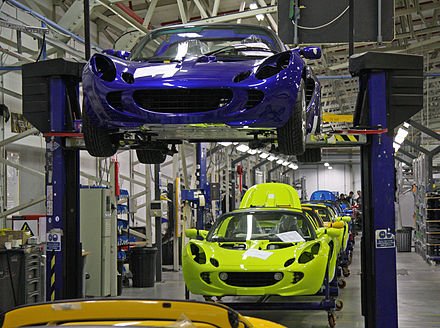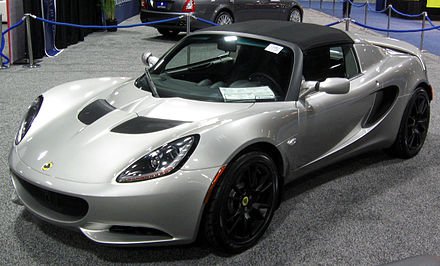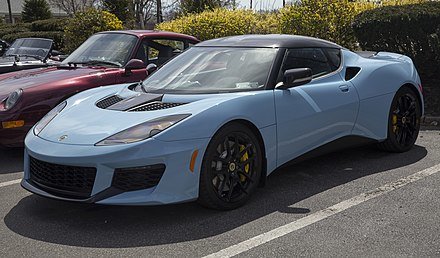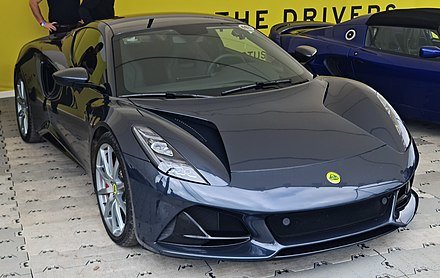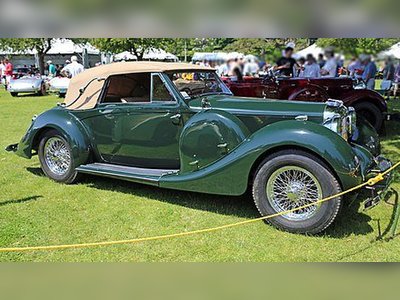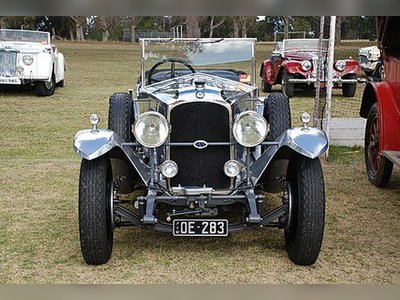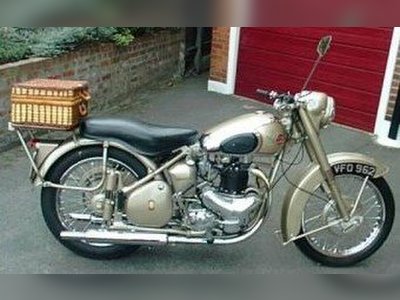British Heritage
Remember, Cherish, Learn.
beta
Lotus
Contribution of Lotus to British Heritage.
Lotus Cars Limited, a British automotive company headquartered in Norfolk, England, has made significant contributions to British heritage through its innovations, achievements in motorsports, and iconic sports cars. Founded in 1952 by Colin Chapman and Colin Dare, Lotus quickly gained recognition for its lightweight and finely-handling sports and racing cars. The company's impact on British heritage can be seen through its influence on motorsports, engineering advancements, and the iconic British sports cars it has produced.
Lotus Cars' early years were marked by a focus on privateer racers and trialists. Their road cars, often offered as kits to save on purchase tax, catered to racing enthusiasts and those seeking thrilling driving experiences. Lotus made a name for itself in the 1960s with models like the Lotus Elan, which garnered critical acclaim. The use of fiberglass bodies, backbone chassis, and innovative overhead camshaft engines, initially supplied by Coventry Climax and later replaced by Lotus-Ford units, showcased the company's engineering prowess.
In the realm of motorsports, Lotus was a trailblazer. The company's sister outfit, Team Lotus, played a crucial role in popularizing the mid-engined layout in IndyCars and Formula One. They developed the first monocoque Formula One chassis and were pioneers in utilizing wings and undersurface shaping for creating downforce. Notably, Lotus cars secured a total of 79 Grand Prix victories and seven Formula One World Constructors' Championships. Legendary drivers like Jim Clark, Graham Hill, and Ayrton Senna achieved Formula One Drivers' Championship wins for Lotus, contributing to the brand's rich motorsports legacy.
Beyond racing success, Lotus Engineering, an offshoot of Lotus Cars, has made significant contributions to the automotive industry. The engineering consultancy firm has facilities across the globe, including the UK, US, China, and Malaysia. Lotus Engineering has been instrumental in developing suspensions for other car manufacturers and designed the 4-cylinder Ecotec engine used in various GM vehicles.
Moreover, Lotus ventured into hybrid and electric vehicle development. The Evora 414E, the company's first hybrid concept car, showcased their innovative approach to sustainable mobility. Additionally, Lotus unveiled the Evija, their first series production electric sports car, demonstrating their commitment to embracing the future of automotive technology.
Lotus has produced a range of iconic British sports cars that have left a lasting impression on automotive enthusiasts worldwide. Models like the Lotus Elise, Exige, and Evora have gained a cult following for their sharp handling, lightweight design, and exhilarating performance. The Lotus Seven, a simple, lightweight open two-seater, remains a beloved classic cherished by automotive purists.
The company's sports cars, especially the Lotus Esprit, hold a place in popular culture, having appeared in James Bond films, The Spy Who Loved Me and For Your Eyes Only. These iconic cars showcased British engineering prowess and style on the silver screen.
Lotus Cars' success has had its fair share of challenges. The company faced financial troubles in the 1980s, but with the leadership of David Wickins, the "savior of Lotus," they experienced a turnaround. Despite changes in ownership, Lotus has persevered, staying true to its ethos of producing performance-oriented and lightweight sports cars.
Over the years, Lotus has had various international owners, including General Motors, A.C.B.N. Holdings S.A., Proton, and its current owners, Geely and Etika Automotive. Each ownership phase has brought different opportunities and challenges, but the spirit of innovation and performance has remained at the heart of Lotus's operations.
With the backing of Geely, Lotus aims to take a significant step into the future of electric mobility. The joint venture with the Renault–Nissan–Mitsubishi Alliance to develop electric performance cars showcases their commitment to sustainable transportation. The forthcoming Emira, set to replace the Elise, Exige, and Evora models, promises to carry on the legacy of Lotus's iconic British sports cars.
In conclusion, Lotus Cars has etched its name in British heritage through its motorsports achievements, engineering innovations, and production of iconic sports cars. The company's contribution to British heritage is evident in its enduring influence on the automotive industry and its status as a symbol of British engineering excellence and driving pleasure. As Lotus continues to embrace the future of electric mobility, its legacy remains firmly rooted in its illustrious past and the unwavering pursuit of automotive perfection.
Early Years and Motorsports Legacy
Lotus Cars' early years were marked by a focus on privateer racers and trialists. Their road cars, often offered as kits to save on purchase tax, catered to racing enthusiasts and those seeking thrilling driving experiences. Lotus made a name for itself in the 1960s with models like the Lotus Elan, which garnered critical acclaim. The use of fiberglass bodies, backbone chassis, and innovative overhead camshaft engines, initially supplied by Coventry Climax and later replaced by Lotus-Ford units, showcased the company's engineering prowess.
In the realm of motorsports, Lotus was a trailblazer. The company's sister outfit, Team Lotus, played a crucial role in popularizing the mid-engined layout in IndyCars and Formula One. They developed the first monocoque Formula One chassis and were pioneers in utilizing wings and undersurface shaping for creating downforce. Notably, Lotus cars secured a total of 79 Grand Prix victories and seven Formula One World Constructors' Championships. Legendary drivers like Jim Clark, Graham Hill, and Ayrton Senna achieved Formula One Drivers' Championship wins for Lotus, contributing to the brand's rich motorsports legacy.
Engineering Advancements
Beyond racing success, Lotus Engineering, an offshoot of Lotus Cars, has made significant contributions to the automotive industry. The engineering consultancy firm has facilities across the globe, including the UK, US, China, and Malaysia. Lotus Engineering has been instrumental in developing suspensions for other car manufacturers and designed the 4-cylinder Ecotec engine used in various GM vehicles.
Moreover, Lotus ventured into hybrid and electric vehicle development. The Evora 414E, the company's first hybrid concept car, showcased their innovative approach to sustainable mobility. Additionally, Lotus unveiled the Evija, their first series production electric sports car, demonstrating their commitment to embracing the future of automotive technology.
Iconic British Sports Cars
Lotus has produced a range of iconic British sports cars that have left a lasting impression on automotive enthusiasts worldwide. Models like the Lotus Elise, Exige, and Evora have gained a cult following for their sharp handling, lightweight design, and exhilarating performance. The Lotus Seven, a simple, lightweight open two-seater, remains a beloved classic cherished by automotive purists.
The company's sports cars, especially the Lotus Esprit, hold a place in popular culture, having appeared in James Bond films, The Spy Who Loved Me and For Your Eyes Only. These iconic cars showcased British engineering prowess and style on the silver screen.
Success and International Ownership
Lotus Cars' success has had its fair share of challenges. The company faced financial troubles in the 1980s, but with the leadership of David Wickins, the "savior of Lotus," they experienced a turnaround. Despite changes in ownership, Lotus has persevered, staying true to its ethos of producing performance-oriented and lightweight sports cars.
Over the years, Lotus has had various international owners, including General Motors, A.C.B.N. Holdings S.A., Proton, and its current owners, Geely and Etika Automotive. Each ownership phase has brought different opportunities and challenges, but the spirit of innovation and performance has remained at the heart of Lotus's operations.
Looking Ahead
With the backing of Geely, Lotus aims to take a significant step into the future of electric mobility. The joint venture with the Renault–Nissan–Mitsubishi Alliance to develop electric performance cars showcases their commitment to sustainable transportation. The forthcoming Emira, set to replace the Elise, Exige, and Evora models, promises to carry on the legacy of Lotus's iconic British sports cars.
In conclusion, Lotus Cars has etched its name in British heritage through its motorsports achievements, engineering innovations, and production of iconic sports cars. The company's contribution to British heritage is evident in its enduring influence on the automotive industry and its status as a symbol of British engineering excellence and driving pleasure. As Lotus continues to embrace the future of electric mobility, its legacy remains firmly rooted in its illustrious past and the unwavering pursuit of automotive perfection.
- Lotus Carsen.wikipedia.org


